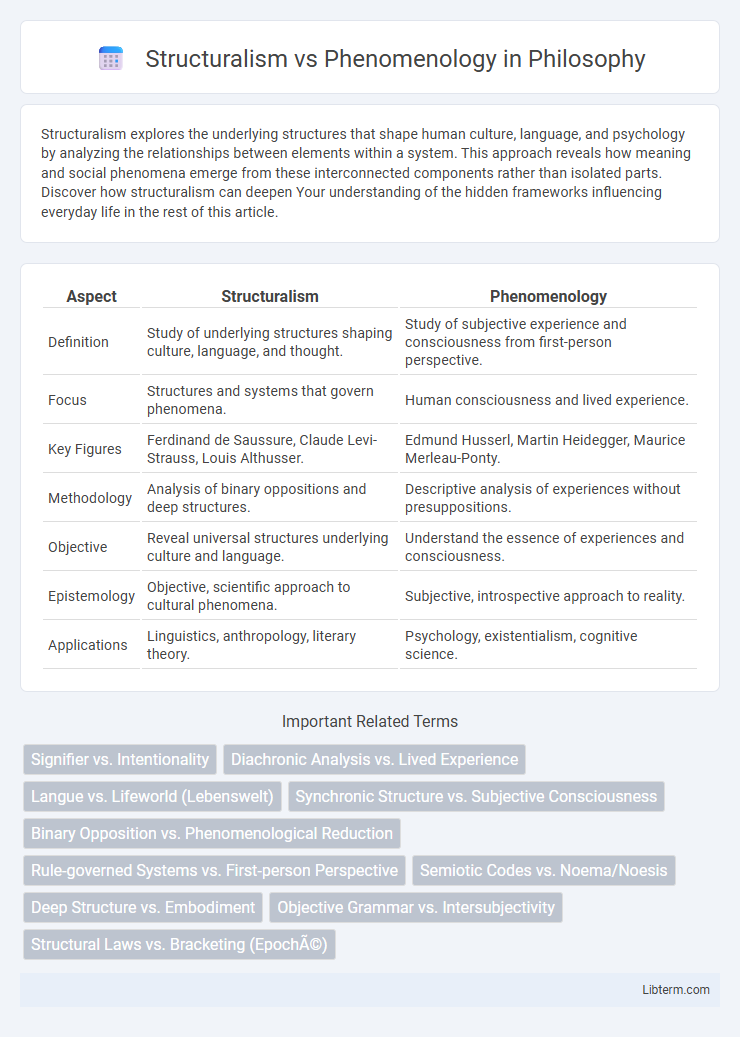Structuralism explores the underlying structures that shape human culture, language, and psychology by analyzing the relationships between elements within a system. This approach reveals how meaning and social phenomena emerge from these interconnected components rather than isolated parts. Discover how structuralism can deepen Your understanding of the hidden frameworks influencing everyday life in the rest of this article.
Table of Comparison
| Aspect | Structuralism | Phenomenology |
|---|---|---|
| Definition | Study of underlying structures shaping culture, language, and thought. | Study of subjective experience and consciousness from first-person perspective. |
| Focus | Structures and systems that govern phenomena. | Human consciousness and lived experience. |
| Key Figures | Ferdinand de Saussure, Claude Levi-Strauss, Louis Althusser. | Edmund Husserl, Martin Heidegger, Maurice Merleau-Ponty. |
| Methodology | Analysis of binary oppositions and deep structures. | Descriptive analysis of experiences without presuppositions. |
| Objective | Reveal universal structures underlying culture and language. | Understand the essence of experiences and consciousness. |
| Epistemology | Objective, scientific approach to cultural phenomena. | Subjective, introspective approach to reality. |
| Applications | Linguistics, anthropology, literary theory. | Psychology, existentialism, cognitive science. |
Introduction to Structuralism and Phenomenology
Structuralism analyzes human culture and cognition through underlying structures, emphasizing language, myths, and social systems as interconnected elements shaping meaning. Phenomenology studies conscious experience from the first-person perspective, focusing on how phenomena are perceived and interpreted without preconceived frameworks. Both approaches seek to understand human experience but diverge in methodology, with Structuralism prioritizing objective structures and Phenomenology emphasizing subjective consciousness.
Historical Origins and Key Philosophers
Structuralism emerged in the early 20th century with key figures like Ferdinand de Saussure, whose linguistic theories laid the groundwork for analyzing underlying structures in culture and language. Phenomenology, founded by Edmund Husserl in the early 1900s, emphasized the direct experience and consciousness, shaping existential and cognitive philosophy. Both movements influenced 20th-century thought but diverged, with Structuralism focusing on objective systems and Phenomenology exploring subjective experience.
Fundamental Principles of Structuralism
Structuralism centers on analyzing the underlying structures that shape human culture, language, and cognition, emphasizing systems of binary oppositions and relationships among elements. It posits that meaning emerges from the interrelations within a whole system rather than from isolated components, with Claude Levi-Strauss's work in anthropology being seminal. Fundamental principles include the idea that structures are universal, unconscious, and mental frameworks guiding human experience and social practices.
Core Concepts in Phenomenology
Phenomenology centers on the study of conscious experience from the first-person perspective, emphasizing intentionality, the idea that consciousness is always about something. Core concepts include epoche, or bracketing, which involves suspending judgments about the external world to focus purely on experience. Unlike Structuralism, which analyzes the underlying structures of language and culture, Phenomenology prioritizes lived experience and the meanings phenomena have for individuals.
Methodological Approaches Compared
Structuralism employs a systematic, scientific method to analyze the underlying structures of language, culture, and cognition by breaking down phenomena into their constituent parts. Phenomenology focuses on the direct investigation and description of lived experience, emphasizing subjective perception and intentionality without preconceived theoretical frameworks. The structuralist approach relies on objective, external analysis, whereas phenomenology prioritizes first-person experiential insight to understand meaning.
Language, Meaning, and Structure
Structuralism analyzes language as a system of interrelated signs where meaning arises from differences within the overall structure, emphasizing the underlying rules and conventions that govern linguistic signs. Phenomenology examines language through lived experience, focusing on how meaning emerges from consciousness and intentionality, highlighting the dynamic interaction between speaker, listener, and the world. Structuralism prioritizes abstract systems and binary oppositions, whereas phenomenology centers on the subjective, embodied encounter with language and its contextual significance.
The Role of Consciousness and Experience
Structuralism analyzes consciousness by breaking down mental processes into basic components, emphasizing the objective structures underlying experience. Phenomenology prioritizes the lived experience, exploring how consciousness is directed toward phenomena and the subjective meaning constructed through perception. Both approaches highlight consciousness but differ in focus: Structuralism seeks universal elements, while Phenomenology centers on individual, experiential context.
Influence on Social Sciences and Humanities
Structuralism significantly shaped social sciences by emphasizing underlying structures that govern human culture, language, and society, influencing fields such as anthropology, linguistics, and sociology. Phenomenology, with its focus on lived experience and consciousness, impacted humanities by encouraging in-depth qualitative analysis, particularly in philosophy, psychology, and literary studies. Both frameworks fostered a deeper understanding of human behavior and social phenomena, promoting interdisciplinary methods that remain pivotal in contemporary research.
Major Criticisms and Debates
Structuralism faces criticism for its rigid focus on underlying systems and neglect of individual consciousness and experience, leading to accusations of reductionism. Phenomenology is debated for its subjective emphasis, which some argue lacks empirical rigor and struggles with generalizability across diverse contexts. Major debates center on the balance between objective structures versus lived experience in understanding human behavior and meaning-making.
Contemporary Relevance and Future Directions
Structuralism continues to influence linguistics and cognitive science by emphasizing underlying systems and patterns in language and thought, while phenomenology shapes contemporary qualitative research and human-centered design through its focus on lived experience and consciousness. Emerging interdisciplinary approaches integrate structuralist frameworks with phenomenological insights to address complex questions in artificial intelligence and embodied cognition. Future directions highlight the potential for merging these paradigms to develop more holistic models of human experience and meaning-making in digital and social environments.
Structuralism Infographic

 libterm.com
libterm.com